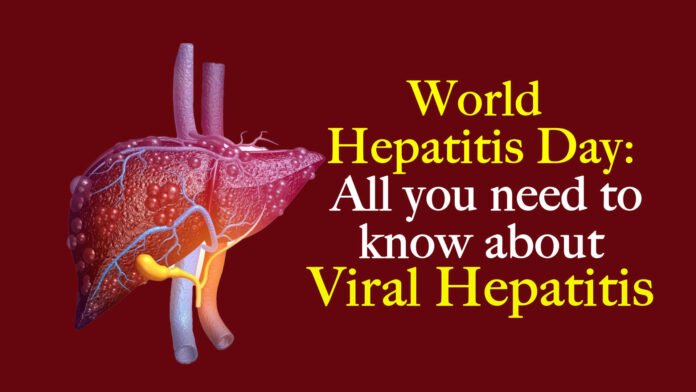Coordination between society, healthcare professionals, governments, and international
organizations is essential if Hepatitis is to be eradicated on a worldwide scale. Effectively
addressing this public health concern requires a well-integrated approach that spans several
disciplines.
In recognition of Dr. Baruch Blumberg’s birthday and his crucial contribution to the discovery
of the Hepatitis B virus, the World Health Organization (WHO) designates July 28 as World
Hepatitis Day. This day offers a chance to collaborate at many levels between people and
governments to develop better answers. Hepatitis is an infection of the liver brought on by
the Hepatitis A, B, C, D, and E viruses as well as other non-infectious substances that
aggravate liver issues. Hepatitis B and C, however, are the most prevalent strains that cause
liver cirrhosis, malignancy, and high death rates.
Hepatitis B or C infections impact 354 million people globally, according to the WHO. Many
of these people lack access to testing and care. Hepatitis-related fatalities can be avoided by
prompt immunization, early discovery, and the right treatment.
Studies have shown that the Hepatitis B vaccine alone has helped save around 49 billion US
dollars in disease-related expenses and roughly 81 billion US dollars in economic and social
costs in low and middle-income countries between 2001 and 2020, giving an idea of the
financial burden of the disease. Along with other serious infectious illnesses including
HIV/AIDS, TB, and malaria, hepatitis is seen as a challenge to global public health. Specific
measures to avoid hepatitis are included in Sustainable Development Goal 3.3, although this
health concern is frequently not given the attention it requires.
Furthermore, a research by the WHO shows that better vaccination coverage, diagnosis,
and educational campaigns can avert an estimated 4.5 million deaths from hepatitis.
Hepatitis has not received enough attention internationally, which has resulted in a lack of
data availability at the national and subnational levels. Attempts to create effective
monitoring programs are hampered by this. Additionally, vaccination capacity and reach
present substantial challenges, particularly in LMICs. Challenges arise from the high
expenses of vaccine research and development (R&D), as well as the length of time and
danger of failure associated with their creation and testing.
Political and geopolitical difficulties impede knowledge transfer or the export of vaccines,
delaying the manufacture of vaccines locally while economic and procedural constraints slow
down production in needy areas. All of these factors together lessen attempts to minimize
the burden of hepatitis in LMICs and prevent it from spreading.
Collectively addressing these problems would improve global health and well-being by
reducing the impact of hepatitis in LMICs. Let’s emphasize Hepatitis prevention, make
investments in research and development, and advance universal access to vaccinations
and treatment.
Especially in low and middle-income nations like LMICs, the impact of hepatitis on health,
the economy, and society demands for the research, manufacture, and distribution of safe
and cheap vaccinations. In this context, the World Health Assembly has been working
toward the elimination of hepatitis since 2016 by adopting a global health sector plan with
the goal of lowering new infections by 90% and deaths attributable to hepatitis by 65% by
- However, the majority of nations have not met the 2020 objectives. A comprehensive
action plan is required to effectively tackle the burdensome nature of hepatitis.
One of the most crucial ways to create a global health plan that is cogent and ensures
accountability and responsibility to all stakeholders without sacrificing quality and equality is
through international collaboration. States may accomplish their health objectives more
quickly and efficiently by enhancing their current healthcare infrastructure. It provides a
framework for national policy interventions and consensus-building as well as chances for
interstate cooperation in developing integrated health policies. Such health policy topics can
offer a basis for discussion and diplomatic connections between nations.
A comprehensive worldwide plan is needed to address the burden of hepatitis, as reported
by WHO. Improved access to treatment has resulted from effective international
collaboration in the fight against hepatitis. Several collaborations, including the World
Hepatitis Alliance (WHA), the Clinton Health Access Initiative (CHAI) Hepatitis Initiative,
Doctors Without Borders (MSF) Hepatitis Program, the Coalition for Global Hepatitis
Elimination (CGHE), the WHO’s Global Hepatitis Program, and support from Gilead
Sciences and many other organizations have greatly decreased the cost of direct-acting
antiviral medications, making them more accessible and affordable to a wider population,
contributing.
By enabling testing and vaccination availability, international collaboration demonstrates to
be crucial in assisting global health systems. However, ongoing outbreaks have highlighted
the necessity for a bigger focus on international cooperation. Due to their proximity to the
affected population and potential for quick reaction, civil society groups are essential to the
development of such cooperation. These stakeholders also have the responsibility of
ensuring that institutions and authorities uphold their obligations. In Ukraine, for instance, the
civil society played a crucial role in promoting the availability of generic drugs and
successfully lowering the price of HIV and hepatitis treatments. This shows how the
mobilization of civil society strengthens support, which is necessary for efficient healthcare
distribution.
The value of cooperation in containing epidemics is demonstrated by lessons learned from
prior successful worldwide partnerships, such as those involving COVID-19 and Severe
Acute Respiratory Syndrome (SARS) in 2003. A full analysis is required of the difficulties and
barriers to international health cooperation in the fight against hepatitis. It is important to
understand geopolitical conflicts, resource-sharing gaps, technological transfer, and
restricted data-sharing agreements, to name a few variables. International collaboration is
still essential to achieve universal health despite these difficulties. These channels may be
used for data exchange, research and development, better vaccine manufacture and
distribution, and improving public knowledge of the hazards associated with hepatitis.
Finally, it should be noted that combating hepatitis through international collaboration
necessitates a thorough comprehension of the intricacies and difficulties associated with
providing for global health. Concern should be given to agreements regarding political
conflicts, resource sharing, and data sharing. In spite of this, reaching the objective of
universal health requires international cooperation. It permits data exchange, research and
development, vaccine manufacture and distribution, and hepatitis risk awareness raising.
Coordination across a variety of sectors, including government, international organizations,
healthcare professionals, and the general public, is required to eradicate the illness. India
and other nations must take the appropriate actions to manage hepatitis globally, since it is a
serious public health risk. India, which has the fifth-largest population in the world, has a
significant hepatitis burden. India has started a nationwide program to combat hepatitis in an
effort to combat this, making it the first nation to do so in this area. India may lead collective
efforts and boost worldwide collaboration to eradicate hepatitis by showing its achievements
in dealing with a comprehensive program to battle the illness.
In order to effectively prevent and treat hepatitis, it is crucial to have a forward-looking view
on trends and changes. Action and readiness for upcoming issues will be sparked by
discussions on how to enhance novel therapies, healthcare systems, and vaccines. The
successful use of telemedicine, digital health records, and AI-driven diagnostics are
examples of how technology may transform healthcare delivery.







